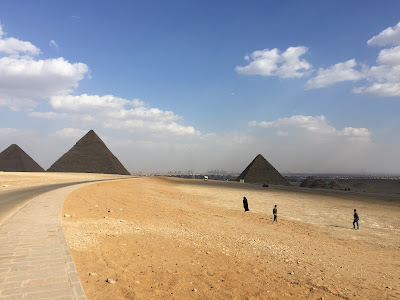Let's start with the the full quotation as there's no fake news here:
"I inherited a mess, it's a mess at home and abroad. A mess. Jobs are pouring out of the country. See what's going on with all of the companies leaving. Going to Mexico and other places. Low minimum wages. Mass instability overseas no matter where you go. The Middle East, a disaster. North Korea. We'll take care of it folks. We'll take care of it all."
So he's begun his term blaming the previous guy. That's actually playbook 'new president' and not objectionable as such as it's been done before over and over.
What galls me here is the idea that this is all a surprise. It's too bad he hadn't campaigned on keeping America's jobs, or the 'threat' of Mexico, and mass instability in other parts of the world. What's that ?...He did ? - well then why act if it's a surprise now ? Because I'd argue he's starting to appreciate the complexity of his role. That's a good thing in some ways, but a frightening one when you imagine he may not actually have understood the depth of the issues he was ranting about pre-election. If we acknowledge that, then we just handed the keys to the country to an individual who seems to have lied on their driving test.
 Let's the honest, being President isn't a job for everybody. The stresses, tough calls and incredibly intricate negotiations to keep everything moving must be like dancing on a pinhead. Politically, you can't screw up your Israeli question or your China policy for fear of what impact it has on trade policy and other foreign relationships. Everything is linked, and it's not just complex, it's a political-economic ecosystem where only 'balance' works. To think a domestic matter isn't effected by trade is to not understand the linkages between current account deficits and mortgage rates, amongst other things. Jobs in any country are driven from a myriad of factors including (but not limited to) technology, GDP, demand from your home market and the trade agreements in place with others and these sands are always shifting.
Let's the honest, being President isn't a job for everybody. The stresses, tough calls and incredibly intricate negotiations to keep everything moving must be like dancing on a pinhead. Politically, you can't screw up your Israeli question or your China policy for fear of what impact it has on trade policy and other foreign relationships. Everything is linked, and it's not just complex, it's a political-economic ecosystem where only 'balance' works. To think a domestic matter isn't effected by trade is to not understand the linkages between current account deficits and mortgage rates, amongst other things. Jobs in any country are driven from a myriad of factors including (but not limited to) technology, GDP, demand from your home market and the trade agreements in place with others and these sands are always shifting.
Is it a mess ? No it's not, but to an uneducated eye the nature of the layers and movement could make it appear so. Provided he's surrounded himself with smart people, and he listens to them, he'll get through this learning curve. He's got a positive economy, no ongoing international troop deployments of size and a degree of domestic security. Looking at the last few presidential transitions, this is a gift.






